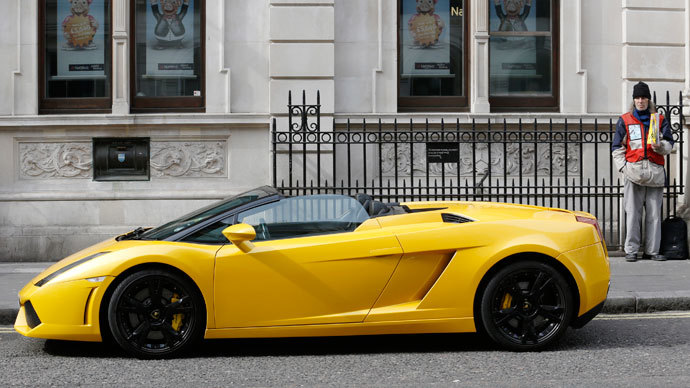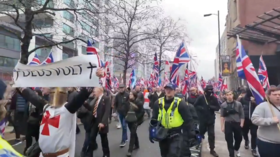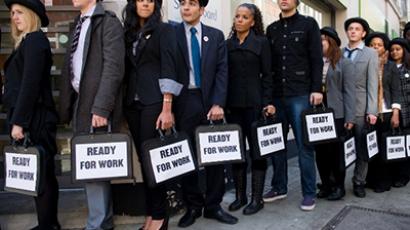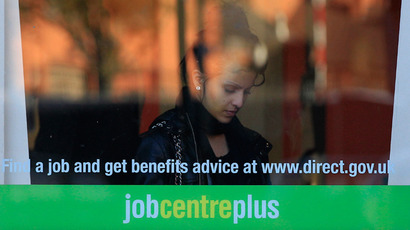UK inequality rising more quickly than under Thatcher – report

The UK government’s welfare cuts and changes to taxation have encouraged economic inequality so intensely that they amount to ‘speeded-up Thatcherism.’ The divide between rich and poor is widening faster than in the 1980s, according to a new report.
The slashing of UK welfare benefits and simultaneous cuts in tax
credits means that inequality will have soared twice as fast by
2015 than it did under the 1980s Conservative Prime Minister,
Margaret Thatcher, according to a Fabian society report to be
published on Monday and previewed in the Independent on Sunday.
Working-age families with children will be particularly hard-hit
in the coming years, according to the report, written by
economist Howard Reed. He laid out the impact of Conservative /
Liberal Democrat coalition policies on household income, drawing
the conclusion that the poorest families in the UK are on a path
to losing some 12 percent of their average income.
However, the UK’s second wealthiest income bracket are set to
lose a mere three percent of their net income, illustrating the
backwardness of the set of policies. Council Tax is used as an
example in the report, which points out how it charges
low-to-middle income families a considerably higher percentage of
their disposable income than the richest British households.
It is “quite possible that the impact of the coalition’s tax
and benefit measures would be as bad for inequality as the
Thatcher government’s record, despite the fact that, by 2015,
David Cameron will have been Prime Minister for less than half as
long as Margaret Thatcher was,” said Reed, comparing it to a
“speeded-up action replay of Thatcherism.”
Thatcher’s premiership was renowned for high unemployment and
social unrest, while being criticized by opponents for promoting
a culture of greed.
Reed went on to underline the Liberal Democrat’s complicit role
in the disparity of wealth.
“This may come as a particular shock to Liberal Democrats in
the government, many of whom spent the 1980s railing against
[this] kind of increase in inequality,” Reed said.
The Liberal Democrats enabled the Conservative Party to form a
coalition government in 2010. At the time, they set out the
party’s general election manifesto promises, telling a London
audience that “our manifesto will hardwire fairness into
British society.”

The Fabian Society declared the need for different political
parties to take action. “This research reveals that income
inequality is set to rise sharply in this parliament. But since
2010 barely a word has been heard from the Labour Party on
equality, certainly compared to past generations,” Andrew
Harrop, general secretary of the Fabian Society, told the
newspaper.
“Faced with a Thatcher-style inequality boom, Labour must
rediscover its egalitarian core and never forget that
redistribution must be part of the answer,” he said.
Economic optimism - just on the surface?
Optimism about the UK economy has been increasing in recent
months: at the beginning of July a British Chambers of Commerce
survey showed a strong rise in firms’ domestic and overseas sales
and high business confidence in the face of increasing exports.
The major business poll also published figures at the end of May
forecasting that the economy would grow 0.9 percent this year.
A bi-annual Lloyds TSB survey published last Monday also showed a
leap in the UK confidence index by 11 points to 30pc over the
past six months, while the latest GDP figures, to be published in
the coming week are also expected to display modest growth.
British Prime Minister David Cameron and Chancellor of the
Exchequer George Osborne are expected to seize the GDP figures to
show evidence of improvement. Osborne has already said that
Britain is “moving from rescue to recovery” and David
Cameron stated in an interview on Sunday that the economy is
“healing.”
However, living standards and household income remain under
pressure.
The Which? Consumer Insight Tracker has demonstrated that a third
of families – totaling some 9 million – are feeling
financially constrained. This compares to only 7.5 million from
July 2012. Food prices have increased 4.3 percent in the year. It
was revealed at the end of May that some 500,000 people in the UK
are resorting to food banks because of squeezes on benefits, wage
cuts and the continuing economic downturn.
“Consumers may be aiding our fragile economic recovery, but
using savings and getting into debt is not sustainable, and more
people are now feeling the squeeze. The Government must do more
to keep spiraling housing, food and energy prices in check,”
Richard Lloyd, executive director of Which? told the Independent.

Real wages have suffered since 2008, falling by more than in any
comparable five year period, the Institute for Fiscal Studies
revealed in June. Between 2010 and 2011, 70 per cent of employees
who stayed in the same job fronted real wage cuts.
Opposition politicians have criticized the present government’s
policies for their divisiveness.
“While this may feel like a recovery for those at the top,
life is getting harder for middle- and low-income families. Wages
after inflation are now down by an average of £1,300 since David
Cameron got into Downing Street, yet bank bonuses soared to £4bn
in April, as high earners took full advantage of the top rate tax
cut,” Chris Leslie, shadow financial secretary to the
Treasury told the paper.
Earlier this month, official Office for National Statistics (ONS)
figures showed that the least well off households have been
coughing up 36.6% of their income to the Treasury while the
wealthiest have been paying less – 35.5% as VAT duty on goods and
fuel hits poorer families harder than the rich, as it stays at
the same rate, regardless of earnings. The figures took into
account both the tax bills of the poorest 20 percent and the
richest 20 percent.
“What more evidence could anyone need that this Government is
piling higher costs on lower and middle-income households while
cutting taxes for the wealthy?” Leslie told Britain’s Mirror
after learning of the ONS figures.














